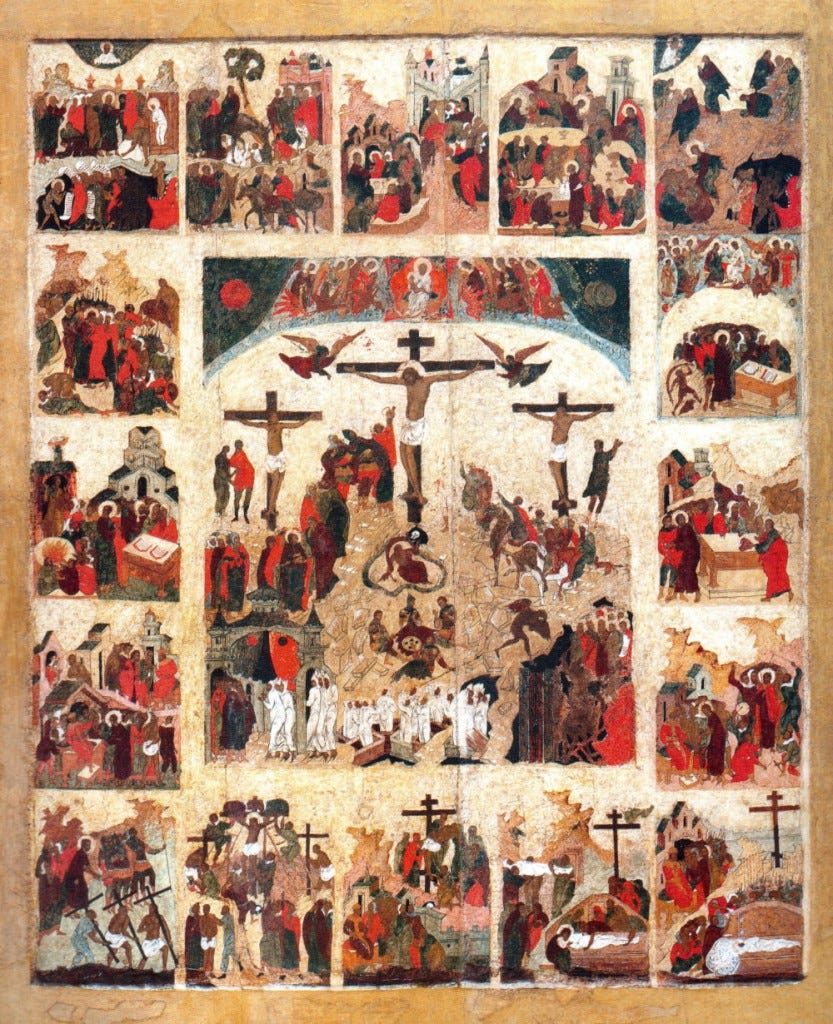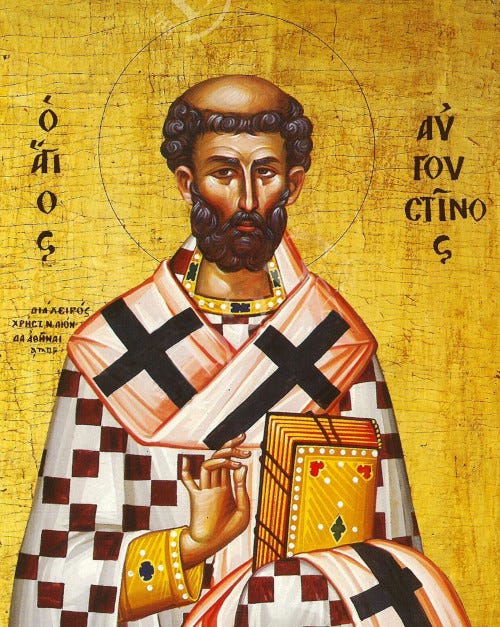St. Augustine of Hippo: Sermon 218, On the Lord’s Passion, On Good Friday
– 18 April 2025 –
SERMON 218: ON THE LORD’S PASSION: ON GOOD FRIDAY
Date: before AD 420
The meaning of the passion
1. The passion of him by whose blood our delinquencies have been blotted out is solemnly read, solemnly celebrated every year, so that our memories may be the more happily refreshed by this annual devotion, and our faith rendered more brilliantly illustrious by the faithful people assembling in great numbers. So this solemn occasion requires of me that I should deliver you a sermon, such as the Lord himself grants me, on his passion. And indeed in the things that our Lord suffered from his enemies, he was pleased to give us an example of patience for our salvation and also for our advantage in the way we lead our lives, so that we ourselves should not refuse to suffer the same sort of things, if that should be his will, for the honor of the gospel.
The fact is, however, that not even in his mortal flesh did he suffer anything out of necessity, but everything of his own free will. And so it may rightly be assumed that by every single deed that was carried out and recorded about his passion, he also wished to signify something.
Christ carries the cross
2. And first, that when he was handed over to be crucified, he himself carried his cross: by this he gave us a sign of self-restraint, and by going ahead like that showed what should be done by anyone who wishes to follow him. He also impressed this upon us by word, when he said, Let anyone who loves me take up his cross and follow me (Mk 8:34). You see, you take up your cross after a fashion, when you control your mortality.
Calvary
3. That he was crucified at the place of the skull, Calvary, signified the forgiveness of all sins through his passion, about which it says in the psalm, My iniquities are multiplied above the hairs of my head (Ps 40: 12).
The two crucified with Jesus
4. That two others were crucified with him on either side, indicated that some are going to suffer on his right hand, others on his left: on his right, those of whom it says, Blessed are those who suffer persecution for the sake of justice (Mt 5:10); on his left, those of whom it is said, And if I hand over my body so that I am burned, but do not have charity, it profits me nothing (1 Cor 13:3).
The king of the Jews
5. That a title was placed over his cross, on which was written The king of the Jews (Jn 19: 19); that showed that not even by killing him could they manage not to have him as the king who is going by his supreme authority to repay them, in the most public way imaginable, according to their works.
Written in three languages
6. That the title was written in three languages, Hebrew, Greek, and Latin (Jn 19:20) amounted to a declaration that he was going to reign over the nations as well as the Jews. To the same effect, in one and the same psalm it says But I have been established as king on Zion his holy mountain, where he reigned, that is to say, in the Hebrew language; and then it adds straightaway, as though in Greek and Latin, The Lord said to me, You are my Son, I today have begotten you: ask of me, and I will give you the nations for your inheritance, and as your possession the ends of the earth (Ps 2:6-8).
Not that Greek and Latin are the only languages of the nations; but that they are the most notable ones, Greek because of the classics of its literature, Latin because of the imperial power of the Romans. Although in these three languages the subjection of the totality of the nations to Christ was being suggested, it still wasn’t written there “and king of the nations,” but only king of the Jews, to remind us of our roots in the people there named. The law, as it says, after all, will go forth from Zion, and the word of the Lord from Jerusalem (Is 2:3). I mean, who are the people who say in the psalm, He has subjected peoples to us, and nations under our feet (Ps 47:3), but those of whom the apostle says, If the nations have shared in their spiritual goods, they ought at least to attend to their needs with material goods (Rom 15:27)?
King of the Jews and the Gentiles
7. That the leaders of the Jews urged Pilate not to write without qualification that he is the king of the Jews, but that he himself said he was the king of the Jews: this had Pilate representing the wild olive to be grafted on in place of the broken branches, because he was a man from the nations, writing for the nations their confession of faith, so that the Lord himself rightly said about them, The kingdom shall be taken away from you, and given to a nation that does justice (Mt 21:43). That does not mean, however, that he is not the king of the Jews. The root, after all, carries the wild olive, not the wild olive the root. And although those branches were broken off for unbelief, that does not mean that God has repudiated his people, whom he foreknew; I too, he says, am an Israelite (Rom 11:1). And although the sons of the kingdom, who did not wish the Son of God to reign over them,” go off into the outer darkness; all the same, many shall come from East and West, and sit down, not with Plato and Cicero, but with Abraham and Isaac and Jacob in the kingdom of heaven (Mt 8:11-12).
Pilate, certainly, wrote king of the Jews, not “king of the Greeks or the Latins”; although he is going to reign over the nations. And what he has written, he has written, and he didn’t change it at the urging of unbelievers. He had been told not to do this such a long time before in the psalms: Do not corrupt the inscription of the title. All the nations believe in the king of the Jews, he reigns over all the nations, but he is still the king of the Jews. Such was the worth and potency of that root, that it could change the engrafted wild olive into itself, while the wild olive could not eliminate the name of the olive.
The garments divided
8. That the soldiers took away his garments and divided them into four parts, signified that his sacraments were going to traverse the four corners of the world.
The tunic without seam
9. That they cast lots for his tunic alone, woven from the top without seam (Jn 19:23-24), rather than dividing it, demonstrated clearly enough that the visible sacraments, even though they too are the garments of Christ, can still be had by anybody, good or bad; but that sincere and genuine faith, which works through love (Gal 5:6) to achieve the integrity of unity—because the love of God has been poured out in our hearts through the Holy Spirit who has been given to us (Rom 5:5)—that this faith does not belong to anybody at all, but is given by God’s hidden grace as by lot. Thus to Simon, who had baptism, and didn’t have this, Peter could say, You have no lot or part in this faith (Acts 8:21).
Mary entrusted to the beloved disciple
10. That on the cross he knew his mother, and entrusted her to the beloved disciple, aptly indicated his human affection at the time when he was dying as a man. This hour had not yet arrived when, as he was about to turn water into wine, he had said to this same mother, What have I to do with you, woman? My hour has not yet come (Jn 2:4). You see, he had not received from Mary the power he had in his divinity, as he had received from Mary what was hanging on the cross.
Vinegar on a sponge
11 . As for what he said, I thirst (Jn 19:28), he was looking for faith from his own people; but because he came to his own possessions, but his own people did not receive him (Jn 1:11), instead of the sweetness of faith, they gave him the vinegar of faithlessness, and that in a sponge. They are indeed comparable to a sponge, a thing not solid but swollen; not open with the straight access of confession, but hollow with the tortuous twists and turns of treachery. ” It’s true that that drink also contained hyssop,” which is a lowly herb, said to have an extremely strong root with which to cling to the rock. There were some, that is to say, among that people, for whom this dark deed was kept as a means of humbling their souls by their repudiation of it later on, and their repentance. The one who accepted the hyssop with the vinegar knew who they were. After all, as the other evangelist bears witness, he even prayed for them, when hanging on the cross he said, Father, forgive them, because they do not know what they are doing (Lk 23:34).
Death with a bowed head
12. That he said, it is accomplished: and bowing his head, he gave up the spirit (Jn 19:30), showed how he died not by necessity but by his own power and authority, waiting until all that had been prophesied for him was accomplished — because this too had been written: And in my thirst they gave me vinegar to drink (Ps 69:22); as one who had the authority to lay down his life, as he himself had declared. And he gave up the spirit in humility, that is with a bowed head; he would receive it back again by rising again, with a raised head. That this death and bowing of the head were acts of great power, was shown by that ancestor Jacob, when he blessed Judah, and said, You have gone up lying down, you have slept like a lion (Gn 49:9); by “going up” he signified his death; by “like a lion” his power.
The broken legs of the two thieves
13. Now next, that the legs of those two were broken, while his were not, because he was already dead: why this happened was stated in the gospel itself. It was fitting, you see, to demonstrate by this sign as well, that the true point and purpose of the Jewish passover, which contained this instruction, not to break the lamb’s bones, was to be a prophetic pre-enactment of his death.
Blood and water from the side of Jesus
14. That his side, struck by a lance, poured out blood and water on the ground: without a shadow of doubt these are the sacraments by which the Church is formed, as Eve was fashioned from the side of the sleeping Adam, who was the model of the one to come.
Burial
15. That Joseph and Nicodemus buried him: as some people have explained their names, Joseph means “Increased”; while Nicodemus, being a Greek name, many will know that it is a compound of “victory” and “people”; because nikos means victory and demos means people. So, who was increased by dying, if not the one who said, If the grain of wheat does not die, it remains alone; but if it dies, it is multiplied (Jn 12:24)? And who by his very dying won a victory over the people which was persecuting him, if not the one who by his rising will sit in judgment upon them?




